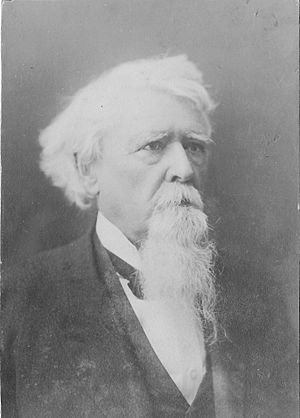William M. Walton facts for kids
Quick facts for kids
William Martin Walton
|
|
|---|---|
 |
|
| 12th Attorney General of Texas | |
| In office 1866–1867 |
|
| Governor | James W. Throckmorton |
| Preceded by | William Alexander |
| Succeeded by | Ezekiel B. Turner |
| Chairman of Texas Democratic Party | |
| In office 1866–1872 |
|
| Personal details | |
| Born | 17 January 1832 Canton, Mississippi |
| Died | 1 July 1915 (aged 83) Austin, Texas |
| Political party | Democratic |
| Spouse | Letitia Ann Watkins |
| Profession | Lawyer, Politician, Author |
| Military service | |
| Allegiance | |
| Branch/service | |
| Rank | |
| Unit | |
| Battles/wars | American Civil War |
William Martin Walton (born January 17, 1832 – died July 1, 1915) was a very important lawyer in Austin, Texas. He was also a soldier during the Civil War. After the war, he became the top lawyer for the state, known as the Attorney General. He also led the state's Democratic Party. By the time he passed away, William Walton was one of the most respected lawyers in all of Texas.
Contents
Discovering William Walton's Early Life
William Martin Walton, often called "Buck" by his family, was born on January 17, 1832. His birthplace was near Canton, Mississippi. He had three brothers and one sister. His older brother, George, gave him the nickname "Buck," which stuck with him his whole life.
In 1834, William's family moved to Carroll County. This area was new land that had recently been part of Native American territories. When William was only seven years old, his father passed away. His mother, Mary, later married Benjamin C. Strange.
The family moved to Texas in 1844. However, William and his brothers returned to Mississippi after just one year. There, William received some money from his late father's estate. Both his stepfather and mother passed away by 1849.
When William was seventeen, he got a job as a deputy district clerk. In about two years, he saved enough money to attend the University of Virginia. He studied law there but did not finish his degree. He returned to Carroll County, Mississippi.
Back in Carrollton, William continued to study law. He learned from a law firm run by William Cothran and James Z. George. In the fall of 1852, he received his license to practice law. He was allowed to do this even though he was not yet 21, thanks to a special law. After getting his license, William and his only surviving brother, George, decided to sell their father's land. They planned to move to Austin, Texas.
While in Carrollton, William met and fell in love with Lettie Watkins, who was seventeen. Her parents had a plantation nearby. William asked Lettie to marry him and move to Texas. However, her parents did not agree. Feeling sad, William started his journey out of Mississippi. But after a day or two, he returned to Carrollton to ask again. This led to a secret engagement between them.
Moving to Texas and Serving in the Civil War
William M. Walton arrived in Austin, Texas, on February 19, 1853. He had just turned 21 a month earlier. He immediately took a job as a deputy clerk in the District Clerk's office. This helped him learn about how law was practiced in Texas.
In July 1853, Andrew Jackson Hamilton, who later became governor of Texas, offered William a partnership. This partnership lasted until Hamilton was elected to the U.S. Congress in 1858. William received a letter from Lettie early that winter. She told him to come for her, saying she would marry him with or without her father's permission. He arrived in Carrollton on February 6, 1854. William and Lettie were married on February 9.
When the Civil War began, the courts in Texas stopped working. William took a job as Governor Francis Lubbock's private secretary. By this time, he and Lettie had three young sons: Newton Samuel, Early Watkins, and George Longstreet.
On March 2, 1862, William felt it was his duty to fight. He joined the Confederate Army. His company, Co. B of the 21st Texas Cavalry Regiment, also known as the Texas Lancers, elected him as their 1st lieutenant.
The 21st Texas Cavalry fought in the Trans-Mississippi Theater. As a lieutenant, William led scouting missions near Helena, Arkansas. In the spring of 1863, he led the main group for Maj. Gen. John S. Marmaduke in the Battle of Cape Girardeau. William was later promoted to major. He joined the staff of Lt. Gen. Theophilus H. Holmes, who commanded the Trans-Mississippi Department. He was stationed at Little Rock, Arkansas.
After the Battle of Helena and the Confederates left Little Rock, William took part in the Red River Campaign. He led a company in the battles of Pleasant Hill and Yellow Bayou. William's last assignment was with Brig. Gen. Alexander Watkins Terrell in southern Louisiana.
William left the army without permission when he learned his wife was very sick. This happened after the birth of their daughter, Sarah, on October 24, 1864. He was never punished for leaving. This was because the Confederacy was breaking apart. In the last months of his life, Major Walton finished writing about his Civil War experiences. He called his book The Epitome of my Life.
When Major Walton returned to Austin, he found his wife had made a wonderful recovery. William sent his family to live with his wife's parents in Mississippi. This was because he worried about Union soldiers occupying Texas during Reconstruction. Reconstruction was the time after the Civil War when the Southern states were rebuilt and rejoined the United States.
William took odd jobs as a clerk to earn money. At that time, former Confederate soldiers were not allowed to practice law. In early 1866, William formed a law partnership with W.P. DeNormandie. DeNormandie had been away from the South during the war, so he was allowed to practice law. Their firm focused on land claims. Law work was hard to find in Austin in 1865. Besides his law work, William also wrote news for the Houston Telegraph newspaper. He reported on events like the 1866 Texas Constitutional Convention.
William Walton's Political Journey
In 1866, William Walton decided to run for District Judge. However, in May, his political party asked him to step aside. They wanted to give another candidate, John Ireland, a better chance against the Republican candidate. John Ireland later became a governor.
Instead, William ran for Attorney General after the original Democratic candidate dropped out. William won the election by a large number of votes. As Attorney General, he had many duties. He even traveled to Washington, DC, to argue a case before the Supreme Court. The state legislature gave him permission to bring his family from Mississippi on his way home.
In 1867, new laws called the Reconstruction Acts were passed. These laws effectively closed down the governments in most Southern states. They also removed Confederate veterans from elected positions. The Democratic government of James W. Throckmorton, which William was a part of, was replaced. A Republican government led by Elisha M. Pease took over, and Texas was placed under military control.
William Walton served as the chairman of the state Democratic executive committee from 1866 to 1872. This was during the Reconstruction period. It was also during the time of Republican Governor Edmund J. Davis, who was not very popular. William helped bring together different groups of people. They worked to fight against the power of the Radical Republicans. Their goal was to regain control of the state government. This happened when Richard Coke was elected governor in 1873.
William planned to run for Attorney General again in the 1876 elections. At the Texas Democratic Convention in January of that year, he had many supporters. It seemed certain he would be chosen. However, he learned that his opponent, Hannibal H. Boone, was a Confederate veteran who had been injured. Boone needed a steady income to support his large family. Because of this, William Walton chose to withdraw from the race.
Later Years and Legacy
After William Walton's law license was given back to him, he started a partnership with John A. Green in 1870. Robert J. Hill later joined the firm, and it became Walton, Green and Hill. In 1882, Major Green moved to San Antonio to practice law with his son. William's son, Newton Walton, then joined the partnership. The firm's name changed to Walton, Hill and Walton. When Newton passed away in 1894, the name became Walton and Hill. After Mr. Hill's death in 1899, it returned to W.M. Walton.
One of William Walton's most well-known clients was a famous figure from the Wild West named Ben Thompson. William helped defend Thompson in 1882. At that time, Thompson was the Austin City Marshal. He was involved in the death of a theater owner in San Antonio. William later wrote a book about Thompson's life called The Life and Adventures of Ben Thompson.
William Walton retired in 1907 after several serious illnesses. He spent his days welcoming visitors on the front porch of his Austin home. His wife, Lettie, passed away on June 23, 1914. William followed her on July 1, 1915. They were both buried in the Walton family plot at Austin's old Oakwood Cemetery.
The Travis County Bar Association, a group of lawyers, honored him. They ordered that his portrait, which hangs in the District Courtroom, be draped in mourning. William Walton's portrait still hangs in a courtroom in the Travis County courthouse today.
Frank Johnson, who wrote the book Texas and Texans, called Major Walton the "Nestor" of the Austin bar. This means he was a wise and respected elder among Austin's lawyers. Johnson also shared a quote from David B. Culberson, who said, "As a trial lawyer I had rather go against any lawyer in the state than 'Buck' Walton." This shows how skilled William was in court.
Johnson also wrote that Major Walton was especially good at land cases and murder cases. He was known for handling more of these types of cases than any other lawyer in Texas by the time he retired. Throughout his long career, William was famous for his speaking ability. He was great at speaking in the courtroom and also when campaigning for his chosen candidates and causes. H. M. Garwood, a former leader of the University of Texas and president of the Texas State Bar Association, named Major Walton as one of Texas' greatest lawyers. He said William was "universally learned" and "constantly engaged in the trial of great criminal cases." He could also easily handle complex federal cases or explain old Spanish land laws.
Images for kids
 | James B. Knighten |
 | Azellia White |
 | Willa Brown |



